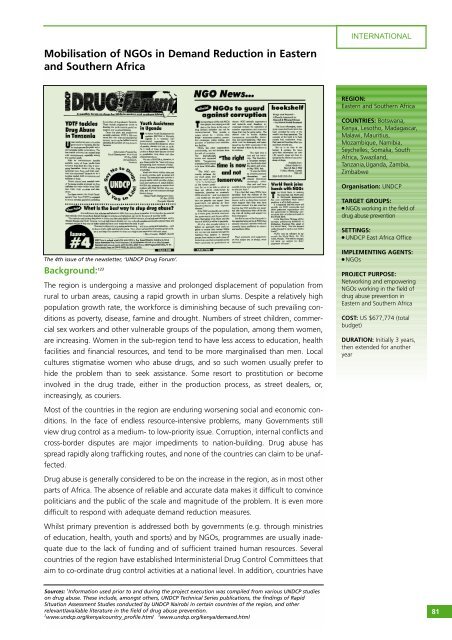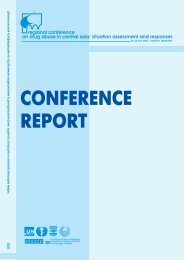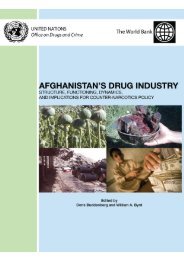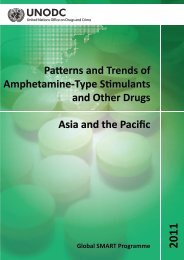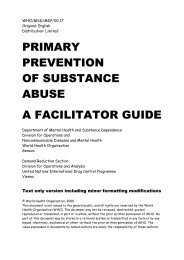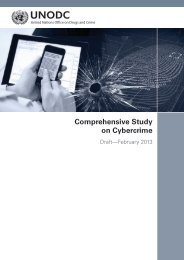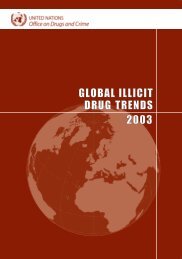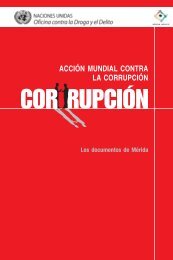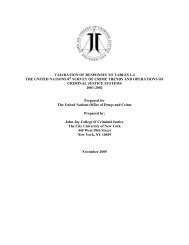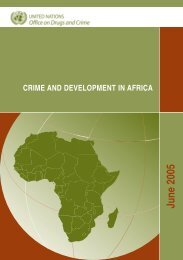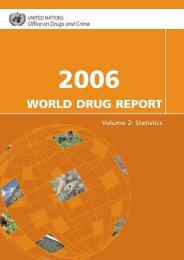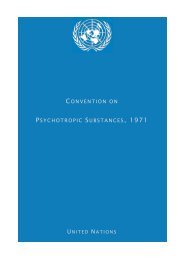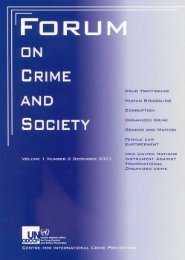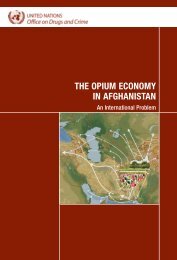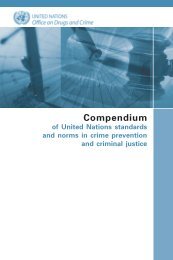PDF (Lessons learned in drug abuse prevention: a global review)
PDF (Lessons learned in drug abuse prevention: a global review)
PDF (Lessons learned in drug abuse prevention: a global review)
Create successful ePaper yourself
Turn your PDF publications into a flip-book with our unique Google optimized e-Paper software.
INTERNATIONAL<br />
Mobilisation of NGOs <strong>in</strong> Demand Reduction <strong>in</strong> Eastern<br />
and Southern Africa<br />
REGION:<br />
Eastern and Southern Africa<br />
COUNTRIES: Botswana,<br />
Kenya, Lesotho, Madagascar,<br />
Malawi, Mauritius,<br />
Mozambique, Namibia,<br />
Seychelles, Somalia, South<br />
Africa, Swaziland,<br />
Tanzania,Uganda, Zambia,<br />
Zimbabwe<br />
Organisation: UNDCP<br />
TARGET GROUPS:<br />
● NGOs work<strong>in</strong>g <strong>in</strong> the field of<br />
<strong>drug</strong> <strong>abuse</strong> <strong>prevention</strong><br />
SETTINGS:<br />
● UNDCP East Africa Office<br />
The 4th issue of the newsletter, ‘UNDCP Drug Forum’.<br />
Background: 123<br />
The region is undergo<strong>in</strong>g a massive and prolonged displacement of population from<br />
rural to urban areas, caus<strong>in</strong>g a rapid growth <strong>in</strong> urban slums. Despite a relatively high<br />
population growth rate, the workforce is dim<strong>in</strong>ish<strong>in</strong>g because of such prevail<strong>in</strong>g conditions<br />
as poverty, disease, fam<strong>in</strong>e and drought. Numbers of street children, commercial<br />
sex workers and other vulnerable groups of the population, among them women,<br />
are <strong>in</strong>creas<strong>in</strong>g. Women <strong>in</strong> the sub-region tend to have less access to education, health<br />
facilities and f<strong>in</strong>ancial resources, and tend to be more marg<strong>in</strong>alised than men. Local<br />
cultures stigmatise women who <strong>abuse</strong> <strong>drug</strong>s, and so such women usually prefer to<br />
hide the problem than to seek assistance. Some resort to prostitution or become<br />
<strong>in</strong>volved <strong>in</strong> the <strong>drug</strong> trade, either <strong>in</strong> the production process, as street dealers, or,<br />
<strong>in</strong>creas<strong>in</strong>gly, as couriers.<br />
Most of the countries <strong>in</strong> the region are endur<strong>in</strong>g worsen<strong>in</strong>g social and economic conditions.<br />
In the face of endless resource-<strong>in</strong>tensive problems, many Governments still<br />
view <strong>drug</strong> control as a medium- to low-priority issue. Corruption, <strong>in</strong>ternal conflicts and<br />
cross-border disputes are major impediments to nation-build<strong>in</strong>g. Drug <strong>abuse</strong> has<br />
spread rapidly along traffick<strong>in</strong>g routes, and none of the countries can claim to be unaffected.<br />
Drug <strong>abuse</strong> is generally considered to be on the <strong>in</strong>crease <strong>in</strong> the region, as <strong>in</strong> most other<br />
parts of Africa. The absence of reliable and accurate data makes it difficult to conv<strong>in</strong>ce<br />
politicians and the public of the scale and magnitude of the problem. It is even more<br />
difficult to respond with adequate demand reduction measures.<br />
Whilst primary <strong>prevention</strong> is addressed both by governments (e.g. through m<strong>in</strong>istries<br />
of education, health, youth and sports) and by NGOs, programmes are usually <strong>in</strong>adequate<br />
due to the lack of fund<strong>in</strong>g and of sufficient tra<strong>in</strong>ed human resources. Several<br />
countries of the region have established Interm<strong>in</strong>isterial Drug Control Committees that<br />
aim to co-ord<strong>in</strong>ate <strong>drug</strong> control activities at a national level. In addition, countries have<br />
IMPLEMENTING AGENTS:<br />
● NGOs<br />
PROJECT PURPOSE:<br />
Network<strong>in</strong>g and empower<strong>in</strong>g<br />
NGOs work<strong>in</strong>g <strong>in</strong> the field of<br />
<strong>drug</strong> <strong>abuse</strong> <strong>prevention</strong> <strong>in</strong><br />
Eastern and Southern Africa<br />
COST: US $677,774 (total<br />
budget)<br />
DURATION: Initially 3 years,<br />
then extended for another<br />
year<br />
Sources: 1 Information used prior to and dur<strong>in</strong>g the project execution was compiled from various UNDCP studies<br />
on <strong>drug</strong> <strong>abuse</strong>. These <strong>in</strong>clude, amongst others, UNDCP Technical Series publications, the f<strong>in</strong>d<strong>in</strong>gs of Rapid<br />
Situation Assessment Studies conducted by UNDCP Nairobi <strong>in</strong> certa<strong>in</strong> countries of the region, and other<br />
relevant/available literature <strong>in</strong> the field of <strong>drug</strong> <strong>abuse</strong> <strong>prevention</strong>.<br />
2 www.undcp.org/kenya/country_profile.html<br />
3 www.undcp.org/kenya/demand.html<br />
81


